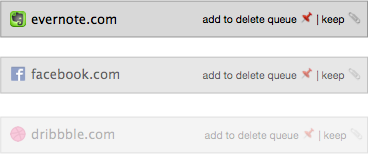In our smartphone-obsessed digital age, we effectively live our entire lives online, which makes us increasingly vulnerable to unseen threats.
Cyber crime, fraud and identity theft are exponentially growing concerns. Our personal lives, locations, and increasingly our passwords are made public online for anyone to find.
If the highly invasive Investigatory Powers Bill (AKA the Snooper's Charter) isn't blocked, then every single digital move you make will be recorded for up to 12 months.
Also, infinite junk mails.
But erasing your digital trace from the World Wide Web can seem overwhelming, especially since each person has on average 1,000,000,000 preferences, passwords, subscriptions and linked accounts. So how would you go about tracking them all down?
In step two Swedish developers, with the easy-assemble, Ikea-style approach.
Wille Dahlbo and Linus Unnebäck have created Deseat.me, which allows you to log in with a Google account, and immediately see which apps and services are linked to it.

The genius part is, instead of having to search all those accounts separately, the site links you directly to the relevant unsubscribe page for that service. It's easy, efficient, and free.
Unfortunately, thusfar the service is only available for accounts and subscriptions linked to Google, which leaves your Hotmail, Yahoo and AOL-related content untouched.
For a similar service, you can use Just Delete Me or Account Killer, both massive directories of links to delete account pages. However, these are only effective when you know the accounts you have.
Here are some other helpful hacks to help ease your digital footprint:
Change your passwords - billions are now available online, and letter-only English-word passwords are the easiest to crack
Consider using symbols and numbers, as well as different passwords for different accounts
Delete unnecessary social media accounts - this could also benefit mental health and productivity
For any accounts you deem necessary, check privacy settings (also consider whether your Instagram page needs to be public)
Since 2013, every tweet posted from your Twitter account from 2006 onwards is archived, even if you delete your account. Consider converting your privacy settings so only approved followers can read your tweets
For undeletable accounts such as Evernote and Pinterest, change your name to a pseudonym, create a random email address to reassign, and delete all the information
Go to 'My Activity' section of your Google account, wipe all search/location history and change account preferences
Similarly, delete all activity from other search engines such as Yahoo and Bing
Consider using a search engine that doesn't track your activity (e.g. DuckDuckGo) rather than Google or Bing
Make sure you click 'unsubscribe' at the bottom of each spam email, before blocking it
Request that search engines delete certain results about you (e.g. via a URL removal tool)
Consider employing the services of a data clearinghouse - although this can be a lengthy and time consuming process
- Check with your phone company to make sure your number isn't listed online, and request that they do not post your details in future
- Remove yourself from data collection sites such as Spokeo, Whitepages and PeopleFinder - this can be difficult, so consider paying for a service like DeleteMe

